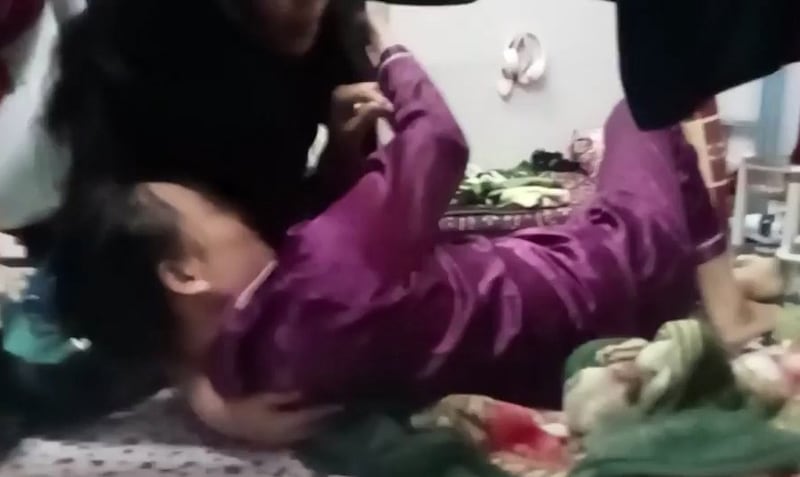Updated 13:15 ET on May 14, 2024
A group of 39 Cambodian women who were exploited as maids in Saudi Arabia and rescued by the Cambodian Embassy in Egypt are asking the Saudi government to help them return home because the embassy keeps delaying their return, they told Radio Free Asia.
The women had come to Saudi Arabia to work as maids, but once they landed they were subjected to physical abuse in the households where they worked, including being denied food and sleep. Some said they had not been paid, or were told they would have to work for much longer than their contracts stated.
In mid-April, dozens of women were rescued from their work settings by Cambodian Embassy staff based in Cairo, which has responsibility for Saudi Arabia.
Ambassador Uk Sarun said that 16 of the women had been sent home in late April, and Cambodian and Saudi officials claimed they were purchasing tickets for the remaining women. But so far they have remained in Saudi Arabia.
Last week, two weeks after they were rescued, the women demanded that they be sent home because the embassy was not providing them adequate food, and their health was deteriorating.
And now, with little apparent sign of their repatriation, they are asking the Saudi government to intervene.
Assurances
The women say a high ranking Saudi labor official will meet with them soon, and that they had already met with Ministry of Labor staff to explain their situation and how they were mistreated.
The labor ministry officials assured them that they would work on their behalf to resolve their mistreatment and ensure they would be get any unpaid wages, a representative of the workers told RFA Khmer on condition of anonymity for safety reasons.
“The Arab officials told us to keep passports to ourselves and be prepared to talk to the company to demand our salary and to get our mistreatment solved,” she said.
“Then, they will stamp the visas so we can return to Cambodia,” she said. “They said they will protect the Cambodian people to be able to go back to Cambodia.”

They also advised her not to trust “Arabian companies” because they are women, she said, implying that some in Saudi Arabia think workers’ rights only apply to men.
Regarding the delay in their repatriation, the workers claim that it’s because their Cambodian employer, Fatina Manpower Co., sold them to a partner company in Saudi Arabia at a high price, and is hoping that maids will give up and complete their contracts.
One of the rescued workers, Ye Thoeun, told RFA that she had worked for more than 20 days in April but she had not been paid.
She said she had only signed on to a three-month contract, but the Saudi company said she needed to work for longer, possibly up to two years.
When she fell ill, she said her boss told her to stay up in her room until she got better, and that she would not be paid for the days she wasn’t working.
“He spoke in Arabic, saying that the price he paid for me is very high, therefore, he cannot send me back to Cambodia,” she said. “But, he said I can go if I pay him US$1,500.”
She said that if she had that kind of money, she would have bought out her own contract and returned home only months after she arrived.
“Now, I just keep crying without hope because there is no solution for me, I don’t know what to do,” she said.
RFA was not able to reach the Cambodian Ambassador to Saudi Arabia Ouk Sarun or Cambodian Labor Ministry spokesman Kata On for comment.
Debt trap
Many of the workers stranded in Saudi Arabia are trapped by their debts.
One of the laborers, Chim Saran, said she could not repay the bank because her employer had not paid her.
“We came from afar expecting to get work to get money to send to the families so we can pay off our debts,” she said.
“But since we got here we have faced many problems, the employers mistreat us in every way,” she said. “They don’t pay us salaries or give us adequate food, and homeowners confine us and if we don’t work for them, they threaten us.”
According to Cambodia’s Ministry of Labor, 133 female workers came to work in Saudi Arabia. The ministry acknowledges that some of these workers have been overworked and are exposed to health problems and a lack of freedom.
However, human rights officials and workers are still urging the Ministry of Labor and other stakeholders to intervene to find other groups of workers who have been exploited by companies and employers to send them back to Cambodia.
Translated by Sum Sok Ry. Edited by Eugene Whong and Malcolm Foster.
Updates to clarify that Cambodian Embassy is based in Egypt, with responsibility for Saudi Arabia.

